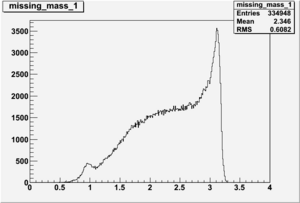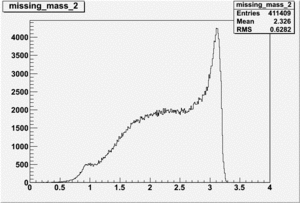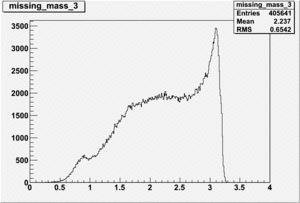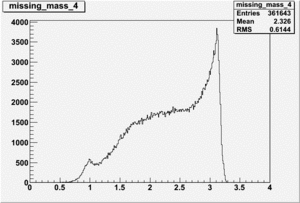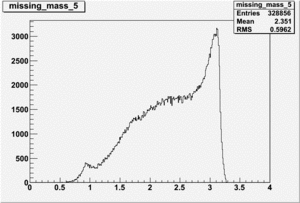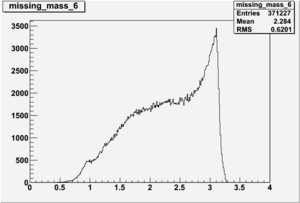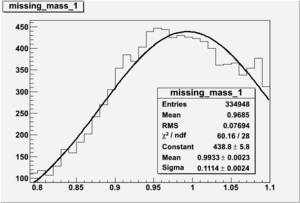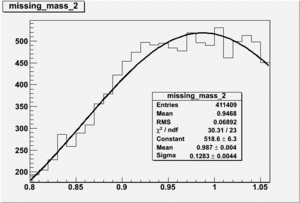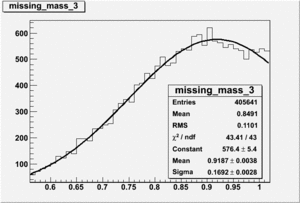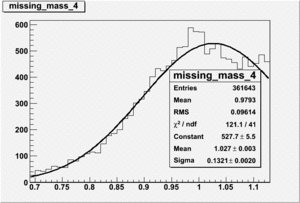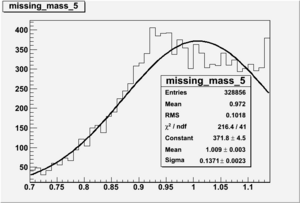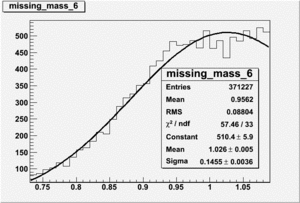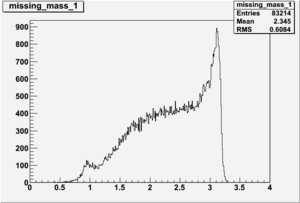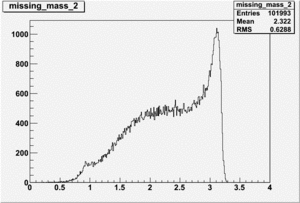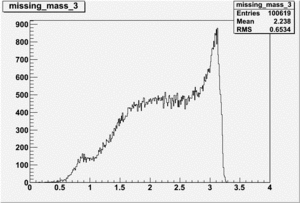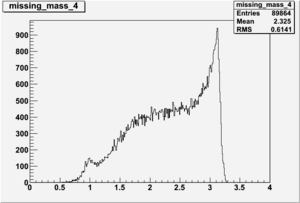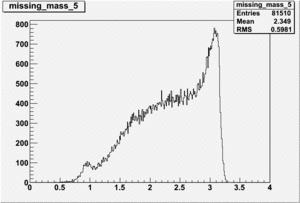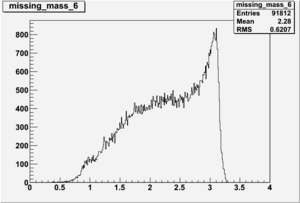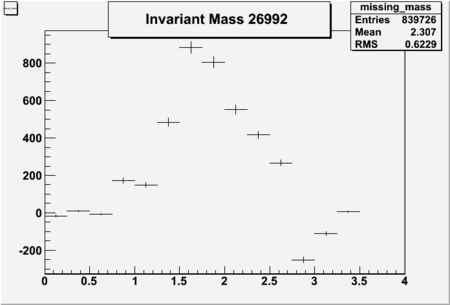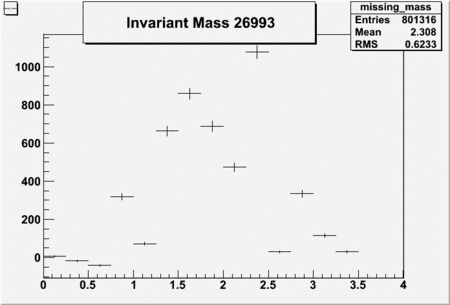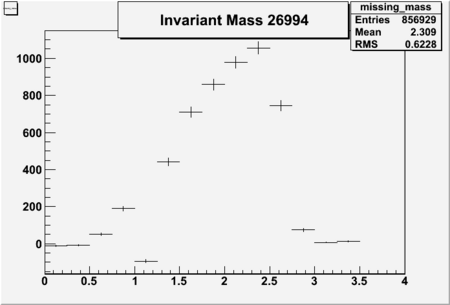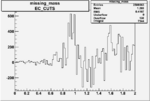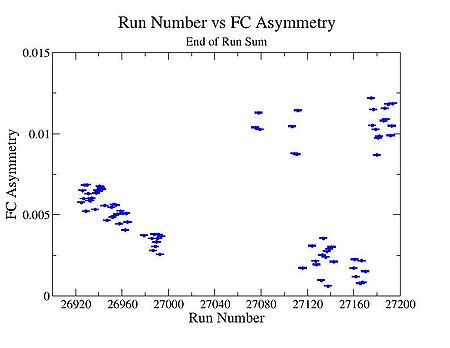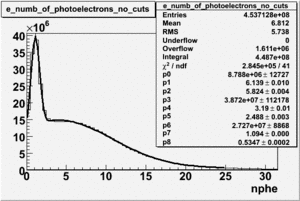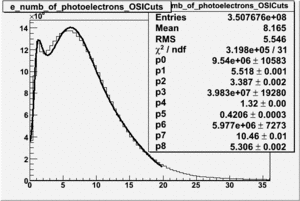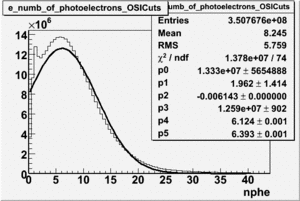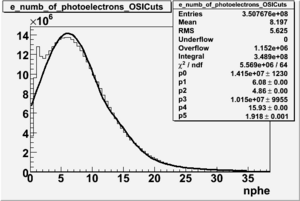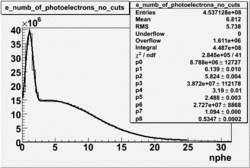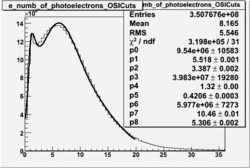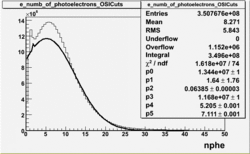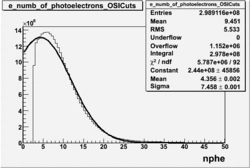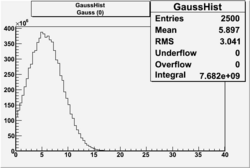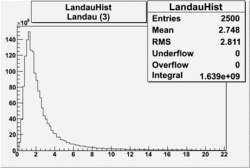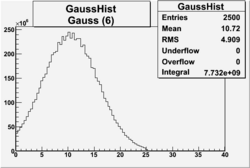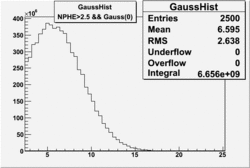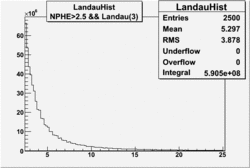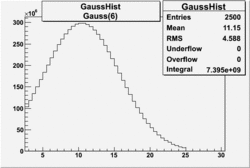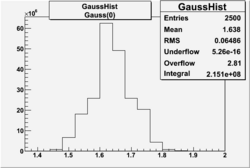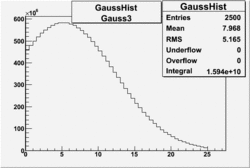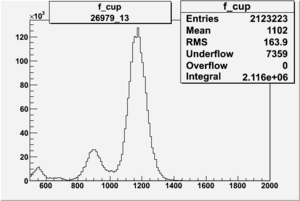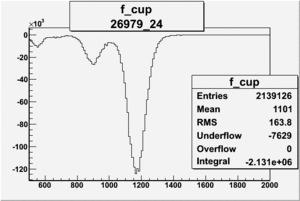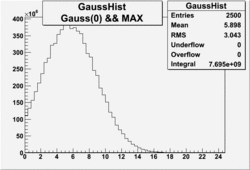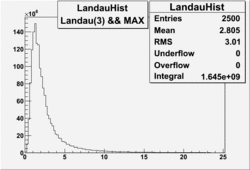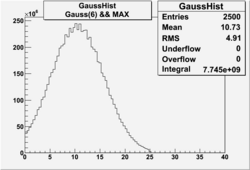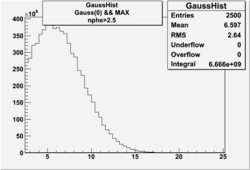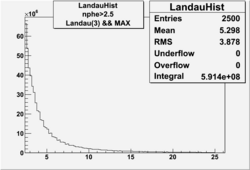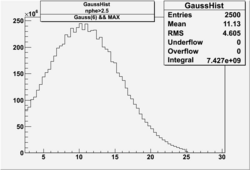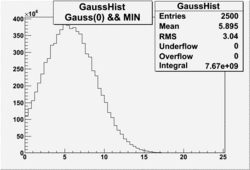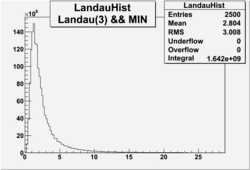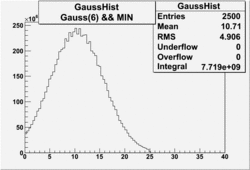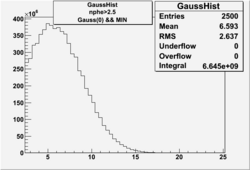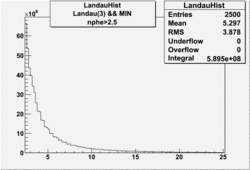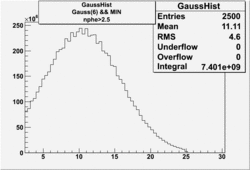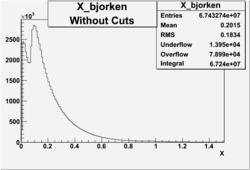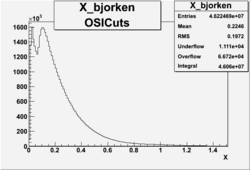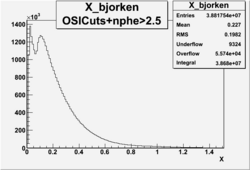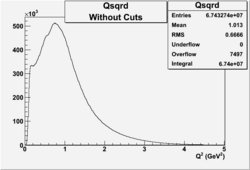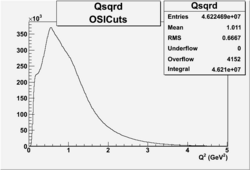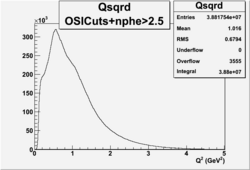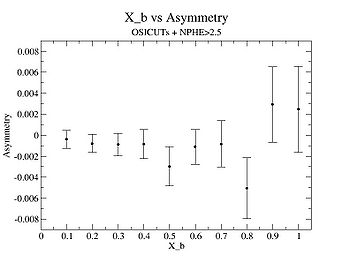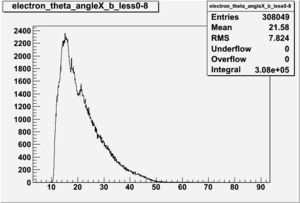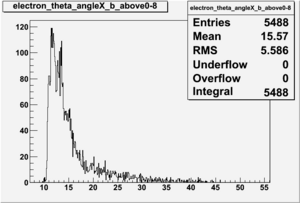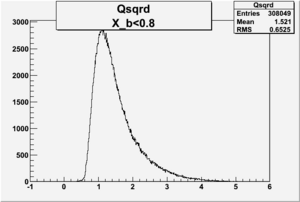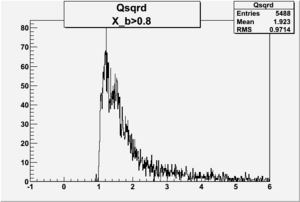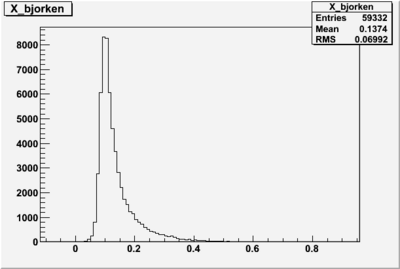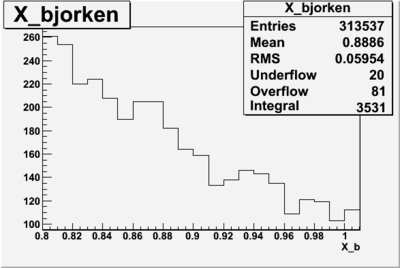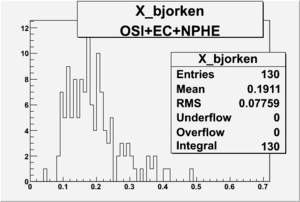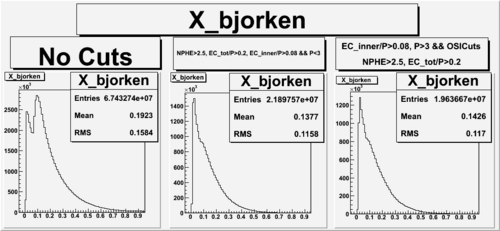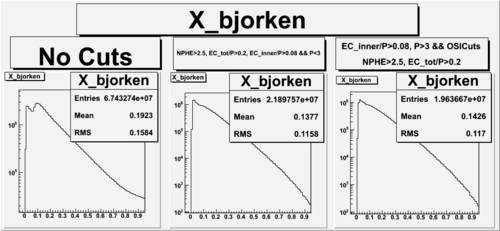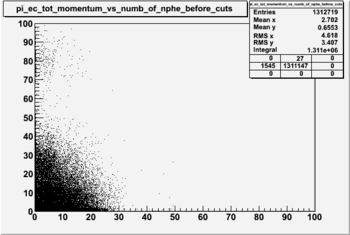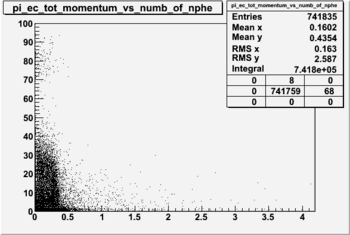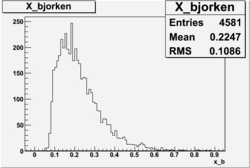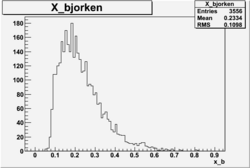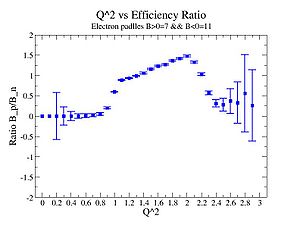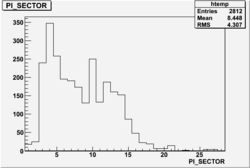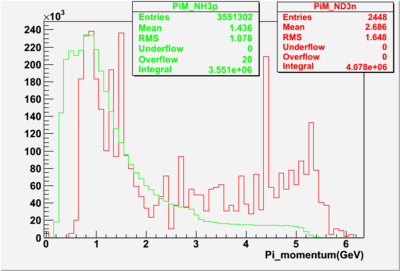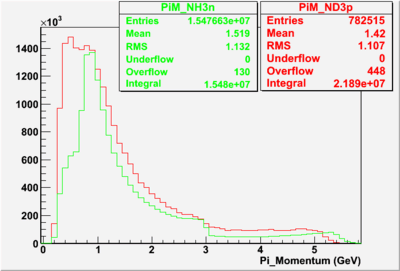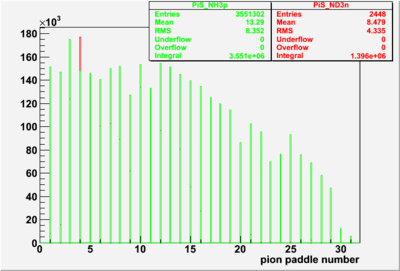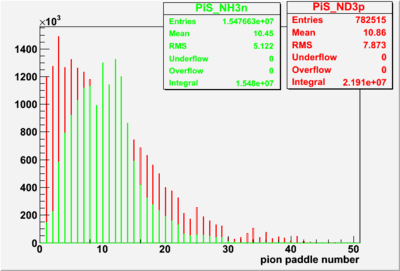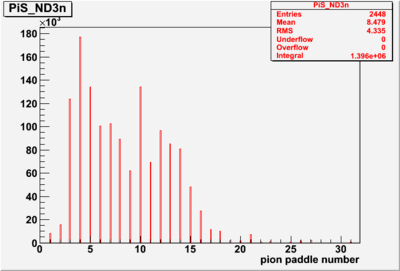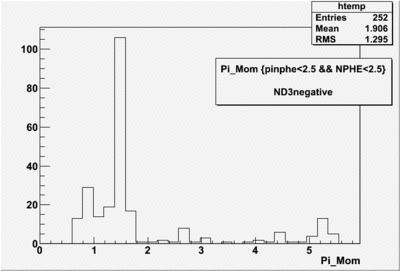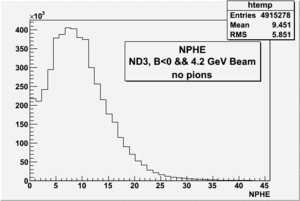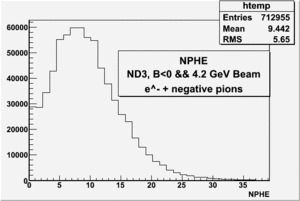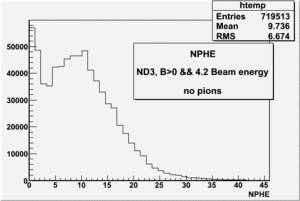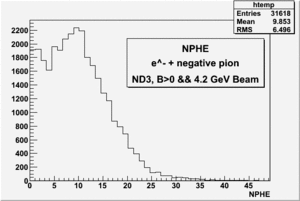Difference between revisions of "DeltaDoverD Progress"
| Line 960: | Line 960: | ||
|} | |} | ||
| − | + | = 2/10/2010= | |
Revision as of 18:13, 6 February 2011
TD_Ddoverd_2008
TD_Ddoverd_2009
TD_Ddoverd_2010
TD_Ddoverd_2011
5-01-2009
Target and Beam Polarization are positive
| Helcode # | Negative Beam Torus | Positive Beam Torus |
| 1 h>0 | 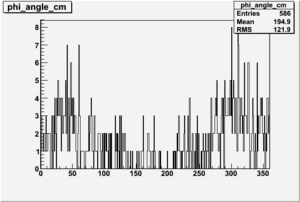 |
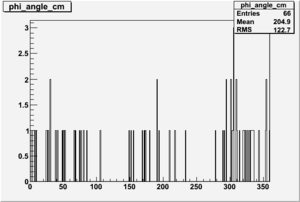
|
| 2 h<0 | 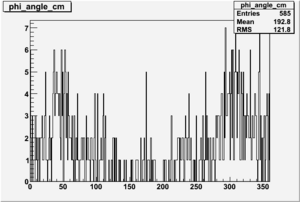 |
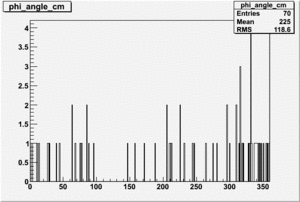
|
| 3 | 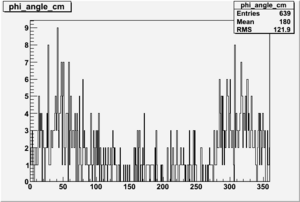 |
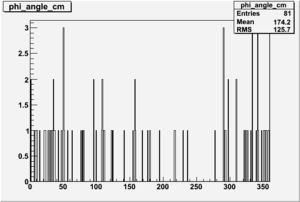
|
| 4 | 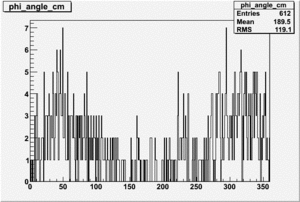 |
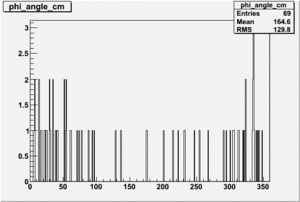
|
Target Polarization Positive and Beam Polarization Negative
| Helcode # | Negative Beam Torus | Positive Beam Torus |
| 1 h>0 | No Data | 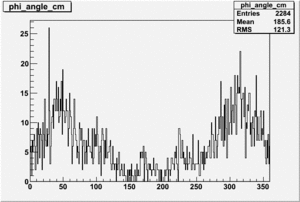
|
| 2 h<0 | No Data | 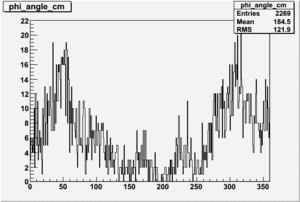
|
| 3 | No Data | 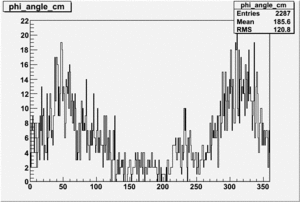
|
| 4 | No Data | 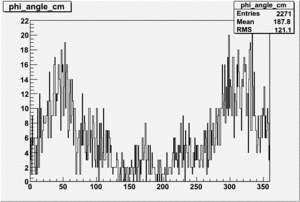
|
Inclusive Histograms For Invariant Mass
Invariant Mass Histograms for Each Sector
All helicities
Helcode=1
3/20/09
1.) plot Wdiff
2.) plot PE using Osipenko/Josh cuts
06/6/09
Invariant Mass
Difference of Invariant Mass for two differnet cuts:
| Run Number | EC Cuts+ requiring pion | OSI Cuts | EC Cuts | |
| 26991 | 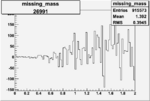 |
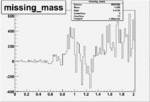 |
On x-axis of FC difference between the "+" heliciy FC and the "-" helicity FC.
| Run Number | W difference | FC difference | End of Run sum |
| 26991 |  |
150px | 0.00354260538 0.00001050400 |
| 26994 | 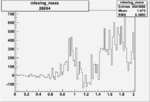 |
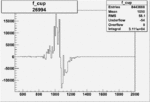 |
0.00367 0.00001088263 |
| 26993 | 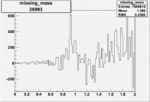 |
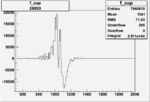 |
0.002559223 0.00001120796 |
| 26992 | 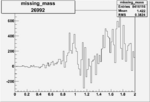 |
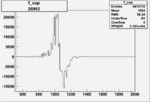 |
0.0037810.00001090044 |
| 26990 | 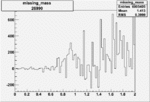 |
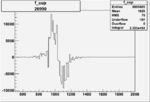 |
0.003319863210.00001203387 |
| 26989 | 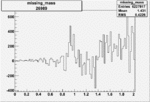 |
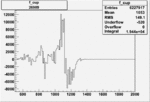 |
0.003038415570.00001267152 |
| 26988 | 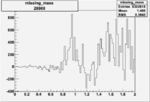 |
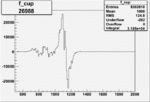 |
0.003801692430.00001097470 |
| 26987 | 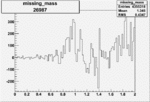 |
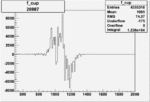 |
0.002801632400.00001515270 |
| 26986 | 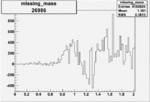 |
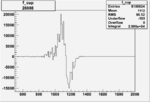 |
0.003528826160.00000048897 |
| 26979 | 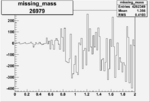 |
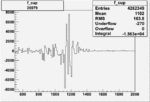 |
-0.003731041260.00001531706 |
| 26965 | 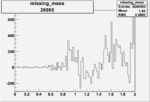 |
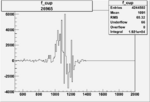 |
0.004541404390.00001534923 |
| 26964 | 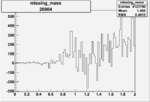 |
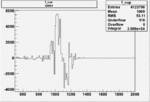 |
0.005094342830.00001557226 |
| 26963 | 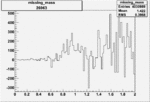 |
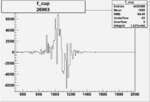 |
0.004052851550.00001575049 |
| 26961 | 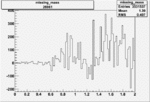 |
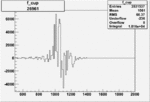 |
0.00507456102 0.00001682744 |
| 26959 | 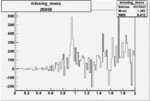 |
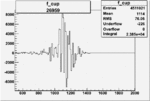 |
0.005237616940.00001488890 |
| 26958 | 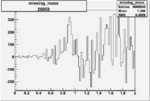 |
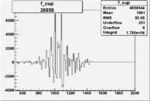 |
0.00444205478 0.00001577510 |
| 26956 | 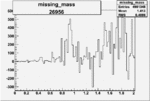 |
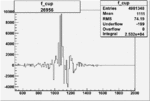 |
0.005044016200.00001565456 |
| 26955 | 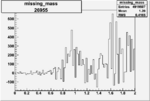 |
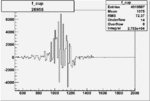 |
0.005599138290.00001425736 |
| 26954 | 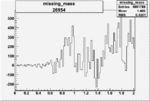 |
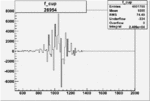 |
0.004946907280.00001443107 |
| 26953 | 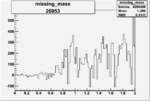 |
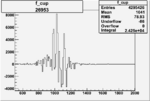 |
0.005625984480.00001525797 |
| 26952 | 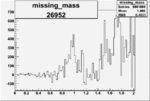 |
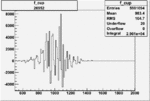 |
0.004852958340.00001293033 |
| 26951 | 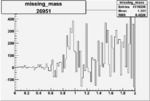 |
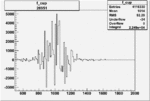 |
0.005454859060.00001558637 |
| 26947 | 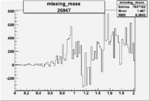 |
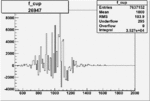 |
0.004656971600.00001144285 |
| 26945 | 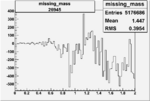 |
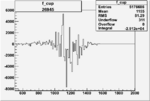 |
-0.00556456389 0.00001389870 |
| 26943 | 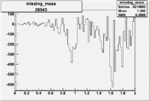 |
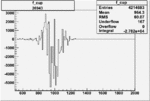 |
-0.006561094720.00001540342 |
| 26942 | 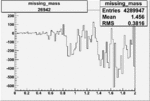 |
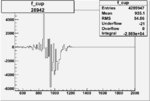 |
-0.006691691060.00001526771 |
| 26941 | 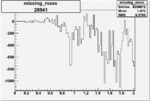 |
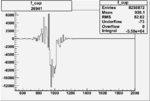 |
-0.006764604170.00001100372 |
| 26940 | 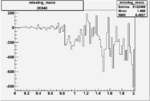 |
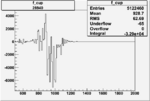 |
-0.00643597022 0.00001397207 |
| 26939 | 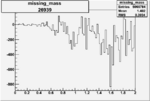 |
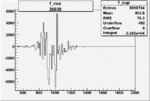 |
-0.006500474560.00001405001 |
| 26938 | 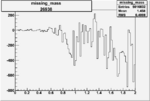 |
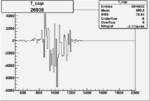 |
-0.006326303130.00001411839 |
| 26937 | 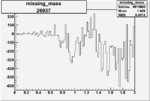 |
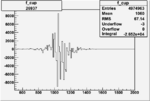 |
-0.005331697940.00001417768 |
| 26934 | 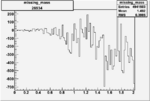 |
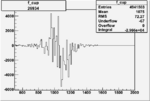 |
-0.006014971560.00001422560 |
| 26933 | 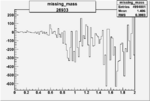 |
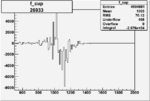 |
-0.005865405000.00001414938 |
| 26932 | 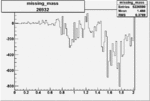 |
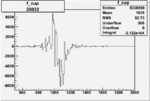 |
-0.005876871920.00001383218 |
| 26931 | 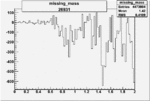 |
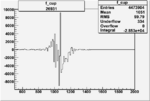 |
-0.006302325660.00001495053 |
| 26930 | 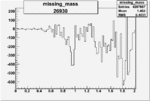 |
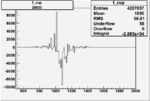 |
-0.006842050100.00001541629 |
| 26929 | 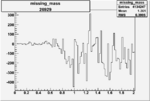 |
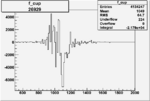 |
-0.005216669440.00001555256 |
| 26928 | 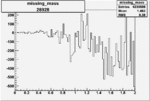 |
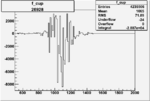 |
-0.006821853160.00001536552 |
| 26927 | 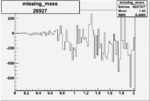 |
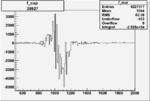 |
-0.005996474830.00001538040 |
| 26926 | 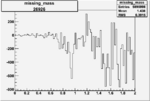 |
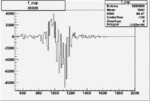 |
-0.006499323780.00001302331 |
| 26925 | 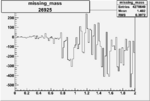 |
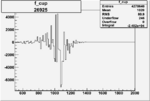 |
-0.005754640990.00001530219 |
| 27079 | 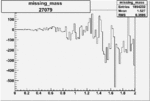 |
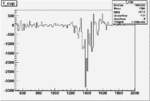 |
-0.010258694700.00002322298 |
| 27078 | 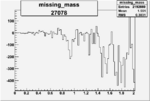 |
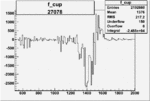 |
-0.011280362660.00002135573 |
| 27075 | 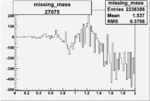 |
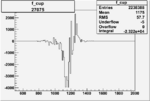 |
-0.010374430170.00002113646 |
| 27109 | 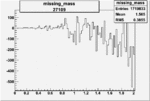 |
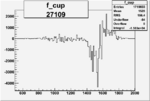 |
-0.008768874650.00002411331 |
| 27107 | 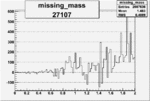 |
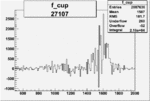 |
0.010445307520.00002188631 |
| 27116 | 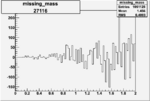 |
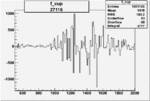 |
0.001732429540.00003084415 |
| 27112 | 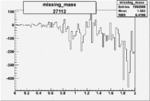 |
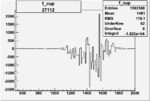 |
-0.011426827610.00002505827 |
| 27111 | 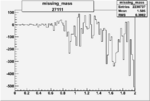 |
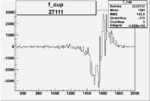 |
-0.008727608860.00002117268 |
| 27128 | 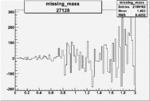 |
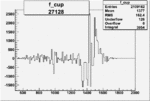 |
0.001934417560.00002177434 |
| 27127 | 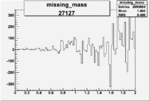 |
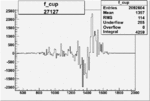 |
0.002157120980.00002186032 |
| 27124 | 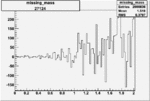 |
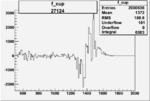 |
0.003090708080.00002235601 |
| 27139 | 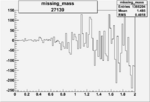 |
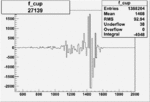 |
-0.002888624440.00002683943 |
| 27138 | 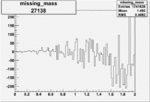 |
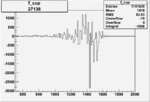 |
-0.000616086340.00002396188 |
| 27137 | 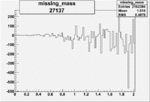 |
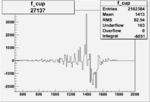 |
-0.002750667780.00002150471 |
| 27136 | 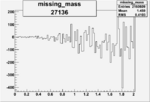 |
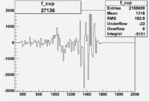 |
-0.002394232370.00002151354 |
| 27134 | 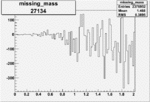 |
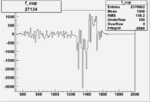 |
-0.003555814340.00002051114 |
| 27133 | 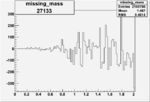 |
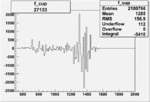 |
-0.002521937240.00002181781 |
| 27132 | 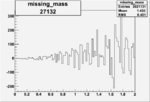 |
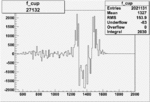 |
0.000963322020.00002224348 |
| 27143 | 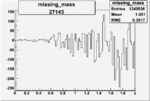 |
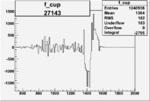 |
-0.002104862780.00002838738 |
| 27141 | 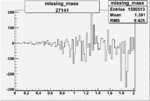 |
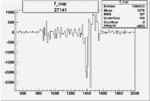 |
-0.003019905560.00002515365 |
| 27160 | 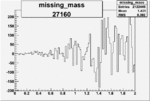 |
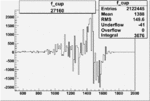 |
0.001712647440.00002170610 |
| 27161 | 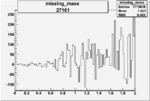 |
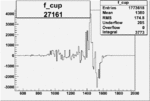 |
0.002242873040.00002374488 |
| 27162 | 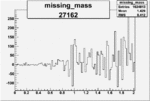 |
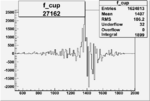 |
0.001188444450.00002480837 |
| 27166 | 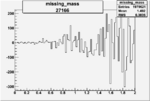 |
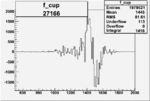 |
0.000772370060.00002247548 |
| 27167 | 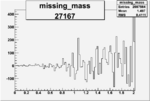 |
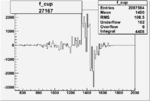 |
0.002160412810.00002188669 |
| 27168 | 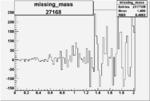 |
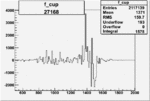 |
0.000836506250.00002173328 |
| 27170 | 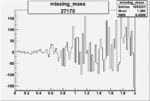 |
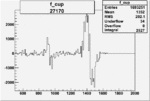 |
0.001512475110.00002430185 |
| 27175 | 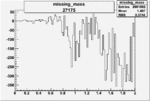 |
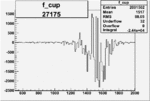 |
-0.012174856680.00002235229 |
| 27176 | 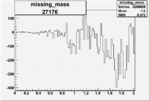 |
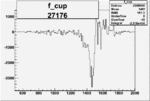 |
-0.010496351670.00002127680 |
| 27177 | 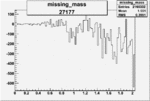 |
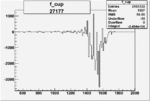 |
-0.011474452880.00002149007 |
| 27179 | 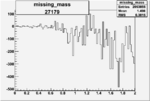 |
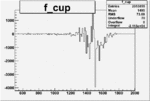 |
-0.010253401530.00002206557 |
| 27180 | 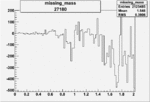 |
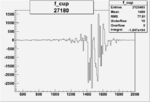 |
-0.008682724180.00002169057 |
| 27181 | 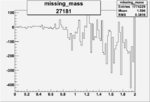 |
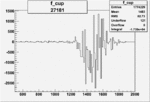 |
-0.009733241880.00002374079 |
| 27182 | 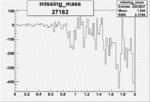 |
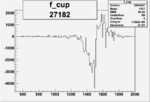 |
-0.009838624600.00002233926 |
| 27183 | 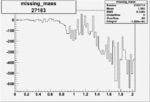 |
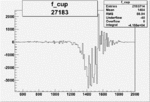 |
-0.019016152520.00002135060 |
| 27186 | 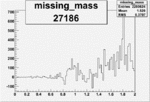 |
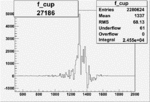 |
0.010790906350.00002093983 |
| 27187 | 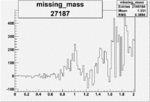 |
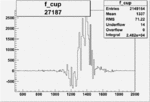 |
0.011555190760.00002157075 |
| 27188 | 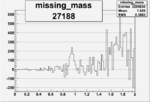 |
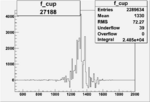 |
0.010868986050.00002089859 |
| 27190 | 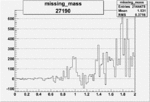 |
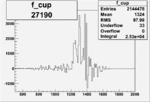 |
0.011812664900.00002159430 |
| 27192 | 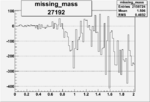 |
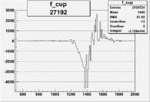 |
-0.009884596370.00002151795 |
| 27193 | 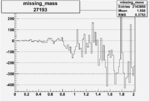 |
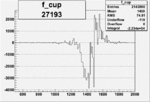 |
-0.010476430360.00002159742 |
| 27194 | 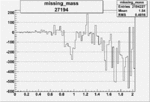 |
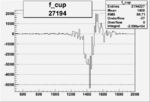 |
-0.011855200030.00002134810 |
NPHE
To find out pion contamination in the electron sample i used Osipenko geometrical cuts. The number of photoelectrons before and after osipenko cuts are shown below:
| No cuts | OSI Cuts |
For different fits:
06/11/09
Pion Contamination
| No cuts | OSI Cuts (Gauss(0)+Landau(3)+Gauss(6)) | OSI Cuts (Gauss(0)+Gauss(3)) | OSICuts + NPHE>2.5 (Gauss) |
OSICuts (Gauss(0)+Landau(3)+Gauss(6))
Assuming that the two gaussians represent number of photoelectrons and landau number of photons produced by high energy pions, the ratio of number of pions over the sum of electrons and pion in the electron candidate sample can be calculated in the following way:
- OSIcut
- OSICut+NPHE>2.5
OSICuts (Gauss(0)+Gauss(3))
In case of only two gaussians, the number of photoelectrons produced by pions is described by Gauss(0) and the number of photoelectrons created by electrons is Gauss(3). Pion contamination is calculated below for both cases, without and with NPHE>2.5 cut.
- OSICut
- With NPHE>2.5 Cut
Number of Events after NPHE>2.5 Cut
=
Counts in FCup
6/12/09
1.) Improve Chi^2 in NPe fits.
2.) Calculate uncertainty in pion contamination measurement by changing mean and widths according to fit error.
3.) Pulse pair FC asymmetry, and End of Run accumulated FC asym.
pulse pair
End of Run sum
4.) Determine semi-inclusive statistic as function of X
Uncertainty in Pion Contamination
Maximum
Minimum
Pion Contamination
It appears that pion contamination in electron sample is 9.63 % 0.01 % before nphe cut and after nphe>2.5 cut contamination is about 4.029% 0.003.
X_bjorken
- 1). alldataOSICuts_X.root - OSICuts applied.
- 2). alldataOSICuts_X_epx.root - OSICuts applied and electron and pion are required.
- 3). alldataOSICuts_X_epxnphe.root - OSICut and nphe>2.5 cuts applied and electron and pion are required.
- 4). alldataX_epxwithoutcuts - No cuts, electron and pion required.
- Number of Events after cuts
| No Cuts | OSI Cuts | OSI+NPHE>2.5 Cuts |
| 68.5 % | 57.5 % |
- Error Calculation
Tthe error in the asymmetry measurement would be
| X_b | X_b Asymmetry | Error | ||
| 0.1 | 0.00087251693 | |||
| 0.2 | 0.0008507530911145 | |||
| 0.3 | 1.0691459e-03 | |||
| 0.4 | 0.0014004231 | |||
| 0.5 | 0.0018665742 | |||
| 0.6 | 0.0016477095 | |||
| 0.7 | 0.0022190018 | |||
| 0.8 | 0.00291609 | |||
| 0.9 | 0.003592967 | |||
| 1 | 0.0040928449 |
I am pretty sure X_{BJ} > 0.8 is not possible with our data set
Electron theta angle and cuts
- electron theta angle for different X_b
X_b when
Number of Events for X_b>0.8
plot the vertex of the above hits with X>0.8
change below to log plots so we can see where XBj stops
10/23/09
After Months of working on detectors and writing thesis proposal it is now time to start doing some physics.
1.) Determine how pion contamination uncertainty changes when you change fit parameters by 1 S.D., 2 S.D., and 3 S.D.
2.) FC asymm plots
3.) Vertex plot for X > 0.8 events.
4.) Now that we have good electron cuts. Plot statistics for Pion cuts.
5.) After pion cuts we start looking add paddle efficiencies so we can subtract sem-inclusive rates using individual paddles but opposite magnetic fields.
Xbjorken
Vertex plot for X > 0.8 events and others
I chose 1<Q^2<4 cut because we used it to plot phi angle in cm frame vs relative rate to compare with the results in paper.
| Cuts | X_bjorken | Vertex X | Vertex Y | Vertex Z | |
| OSI Cuts + EC Cuts | 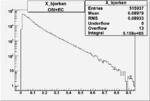 |
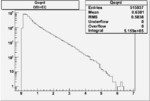 |
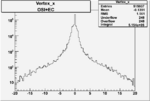 |
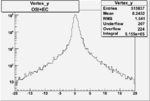 |
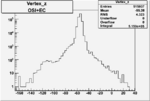
|
| OSI Cuts + EC Cuts + X_b>0.8 | 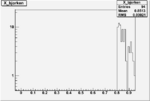 |
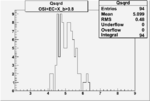 |
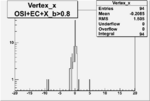 |
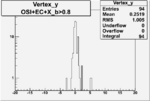 |
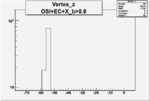
|
| OSI Cuts + EC Cuts + X_b<0.8 | 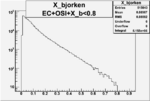 |
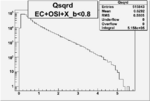 |
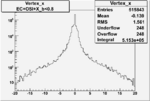 |
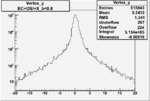 |
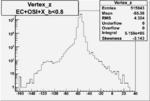
|
| OSI Cuts + EC Cuts + 1<Q^2<4 | 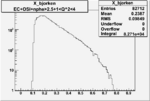 |
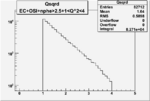 |
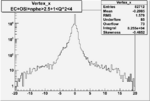 |
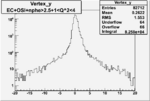 |
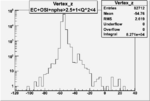
|
| Cuts | The scattered electron energy | electron scattering angle |
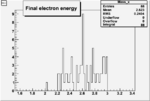 |
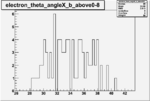
| |
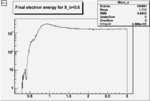 |
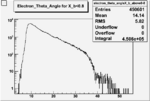
|
FC Asymmetry
FC Asymmetry plot using the following method : End of Run sum
Pion contamination
Determine how pion contamination uncertainty changes when you change fit parameters by 1 S.D., 2 S.D., and 3 S.D.
Pion contamination(3 S.D.) in electron sample is 9.645 % 0.025%.
It doesnt really change from using 1 S.D.
Pion Statistics
Before and after cuts the plot of EC_tot/P vs nphe(for pions)
10/30/09
After Months of working on detectors and writing thesis proposal it is now time to start doing some physics.
1.) Determine how pion contamination uncertainty changes when you change fit parameters by 1 S.D., 2 S.D., and 3 S.D.
2.) Do pulse pair FC asymm plot
3.) Check program's calculation of event with X > 0.8 events. and compare to similar event with X < 0.8
4.) Use statistics for Pion cuts to estimate SIDIS statistical error -vs- Xbj
5.) After pion cuts we start looking add paddle efficiencies so we can subtract sem-inclusive rates using individual paddles but opposite magnetic fields.
1.)
1.) Determine how pion contamination uncertainty changes when you change fit parameters by 1 S.D., 2 S.D., and 3 S.D.
In case of 10 S.D. : &&
3.)
I suspect the X_b >0.8 event below are pions mis-identified as electrons To figure out. Write down event number for events below as well as run number and file name. The use path length and Scintillator TDC time to determine beta under assumption that particle is a pion. Does the momentum and energy make sense? Download the cooked data file from JLab for these events so we can use CED to look at them and bosdump to look at the reconstruction.
- 1
Ebeam=5736
IBeam=4.2
ITorus=2248
ITarg=122
BeamPol=0.71
TargetPol=-0.67
BadRun=0
Target=18
PolPlate=0
Version=2
Prescalers:0:0:0:0:0:0:0
dump=13
W= 1.3504
Q= 4.78723
final electron energy= 2.6823
initial electron energy= 5.736
electron theta angle= 32.3896
- 2
Ebeam=5736
IBeam=4.2
ITorus=2248
ITarg=122
BeamPol=0.71
TargetPol=-0.67
BadRun=0
Target=18
PolPlate=0
Version=2
Prescalers:0:0:0:0:0:0:0
dump=13
W= 1.41085
Q= 5.1186
final electron energy= 2.41678
initial electron energy= 5.736
electron theta angle= 35.3749
- 3
Ebeam=5736
IBeam=4.2
ITorus=2248
ITarg=122
BeamPol=0.71
TargetPol=-0.67
BadRun=0
Target=18
PolPlate=0
Version=2
Prescalers:0:0:0:0:0:0:0
dump=13
W= 1.2575
Q= 4.83661
final electron energy= 2.7851
initial electron energy= 5.736
electron theta angle= 31.9378
- 1
W= 3.07188 Q= 0.229403 final electron energy= 1.0543 initial electron energy= 5.736 electron theta angle= 11.177
- 2
hit return for next event, q to quit: W= 2.48202 Q= 1.382 final electron energy= 2.18587 initial electron energy= 5.736 electron theta angle= 19.1106
- 3
hit return for next event, q to quit: W= 2.92788 Q= 0.274895 final electron energy= 1.49046 initial electron energy= 5.736 electron theta angle= 10.2878
4.)
| && | && | && | && |
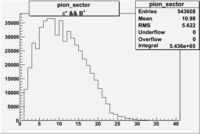 |
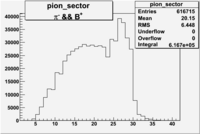 |
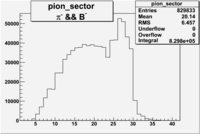 |
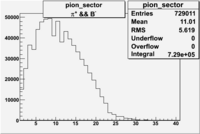
|
1-12-09
Root files: alldatasector26990_4.root, alldatasector26990_5.root, alldatasector27113_4.root, alldatasector27113_5.root.
9/13/09
1.) Determine how pion contamination uncertainty changes when you change fit parameters.
| Fit parameters | Pion Contamination |
| 1 S. D. | 9.63 % 0.01 % |
| 3 S. D. | 9.645 % 0.025 % |
| 10 S. D. | 9.446 % 0.0233 % |
2.) Do pulse pair FC asymm plot
I did it for one file(dst27113_00.B00) and it was zero.
3.) Check program's calculation of event with X > 0.8 events. and compare to similar event with X < 0.8
I suspect the X_b >0.8 event below are pions mis-identified as electrons To figure out. Write down event number for events below as well as run number and file name. The use path length and Scintillator TDC time to determine beta under assumption that particle is a pion. Does the momentum and energy make sense? Download the cooked data file from JLab for these events so we can use CED to look at them and bosdump to look at the reconstruction.
Calculation is right, need to check CED, but dont have it on daq.
4.) Use statistics for Pion cuts to estimate SIDIS statistical error -vs- Xbj
Insert table with X bj, number of reconstructed pions, statistical error.
no cut
root alldatasector27113_5_1.root
root [9] .p X_bjorken->GetBinError(2); (const Double_t)3.50713558335003626e+01 root [10] .p X_bjorken->GetBinContent(2); (const Double_t)1.23000000000000000e+03
root [11] .p X_bjorken->GetBinContent(3); (const Double_t)1.85200000000000000e+03 root [12] .p X_bjorken->GetBinError(3); (const Double_t)4.30348695827000256e+01
root [13] .p X_bjorken->GetBinError(4); (const Double_t)3.06431068920891256e+01 root [14] .p X_bjorken->GetBinContent(4); (const Double_t)9.39000000000000000e+02
root [15] .p X_bjorken->GetBinContent(5); (const Double_t)3.68000000000000000e+02 root [16] .p X_bjorken->GetBinError(5); (const Double_t)1.91833260932508765e+01
(const Double_t)1.91833260932508765e+01 root [17] .p X_bjorken->GetBinError(6); (const Double_t)1.14017542509913792e+01 root [18] .p X_bjorken->GetBinContent(6); (const Double_t)1.30000000000000000e+02
root [19] .p X_bjorken->GetBinContent(7); (const Double_t)4.10000000000000000e+01 root [20] .p X_bjorken->GetBinError(7); (const Double_t)6.40312423743284853e+00
root [21] .p X_bjorken->GetBinError(8); (const Double_t)3.74165738677394133e+00 root [22] .p X_bjorken->GetBinContent(8); (const Double_t)1.40000000000000000e+01
root [23] .p X_bjorken->GetBinContent(9); (const Double_t)5.00000000000000000e+00 root [24] .p X_bjorken->GetBinError(9); (const Double_t)2.23606797749978981e+00
root [25] .p X_bjorken->GetBinError(10); (const Double_t)1.41421356237309515e+00 root [26] .p X_bjorken->GetBinContent(10); (const Double_t)2.00000000000000000e+00
with cut
root alldatasector27113_5.root
root [3] .p X_bjorken->GetBinError(2); (const Double_t)2.89827534923788761e+01 root [4] .p X_bjorken->GetBinContent(2); (const Double_t)8.40000000000000000e+02
root [5] .p X_bjorken->GetBinError(3); (const Double_t)3.77491721763537456e+01 root [6] .p X_bjorken->GetBinContent(3); (const Double_t)1.42500000000000000e+03
root [7] .p X_bjorken->GetBinError(4); (const Double_t)2.82488937836510701e+01 root [8] .p X_bjorken->GetBinContent(4); (const Double_t)7.98000000000000000e+02 root [9] .p X_bjorken->GetBinError(5); (const Double_t)1.81107702762748346e+01 root [10] .p X_bjorken->GetBinContent(5); (const Double_t)3.28000000000000000e+02
root [11] .p X_bjorken->GetBinError(6); (const Double_t)1.04880884817015154e+01 root [12] .p X_bjorken->GetBinContent(6); (const Double_t)1.10000000000000000e+02
root [13] .p X_bjorken->GetBinError(7); (const Double_t)6.24499799839839831e+00 root [14] .p X_bjorken->GetBinContent(7); (const Double_t)3.90000000000000000e+01
root [15] .p X_bjorken->GetBinError(8); (const Double_t)3.60555127546398912e+00 root [16] .p X_bjorken->GetBinContent(8); (const Double_t)1.30000000000000000e+01
root [17] .p X_bjorken->GetBinError(9); (const Double_t)1.73205080756887719e+00 root [18] .p X_bjorken->GetBinContent(9); (const Double_t)3.00000000000000000e+00
root [19] .p X_bjorken->GetBinError(10); (const Double_t)0.00000000000000000e+00 root [20] .p X_bjorken->GetBinContent(10); (const Double_t)0.00000000000000000e+00
root [21] .p X_bjorken->GetBinError(11); (const Double_t)0.00000000000000000e+00 root [22] .p X_bjorken->GetBinContent(11); (const Double_t)0.00000000000000000e+00
root [23] .p X_bjorken->GetBinError(12); (const Double_t)0.00000000000000000e+00 root [24] .p X_bjorken->GetBinContent(12); (const Double_t)0.00000000000000000e+00
| Error | |
| 0.1 | 0.034503278 |
| 0.2 | 0.026490647 |
| 0.3 | 0.035399616 |
| 0.4 | 4.255675067 |
| 0.5 | 0.095346259 |
| 0.6 | 0.160128154 |
| 0.7 | 0.277350098 |
| 0.8 | 0.577350269 |
5.) After pion cuts we start looking add paddle efficiencies so we can subtract sem-inclusive rates using individual paddles but opposite magnetic fields.
Your B-field sign change does effect paddle distribution?
The table below represents the distribution of electrons and pions on the scintillator paddles using the reaction
e(p/d,e')\pi X
| File number | electron | electron | ||
| 26990, B<0 | 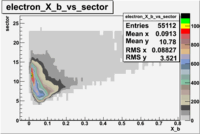 |
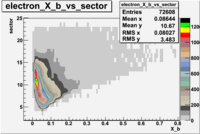 |
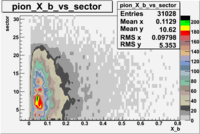 |
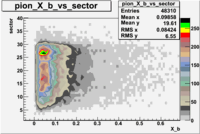
|
| 27113, B>0 | 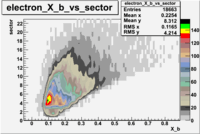 |
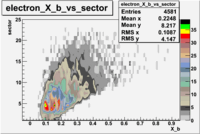 |
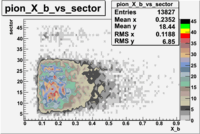 |
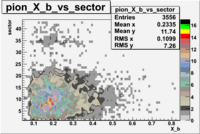
|
- 1.) 7< Sector_paddle <11 - (B>0, ) - 15.3% && (B<0, ) - 10.9%
- 2.) 25< Sector_paddle <29 - (B>0, ) - 7.775% && (B<0, ) - 10.97%
&&
Using Two runs: 26990(NH3, -2250) and 27124(ND3, +2250)
root files: alldatasector27124_4.root && alldatasector27124_5.root
root files: alldatasector26990_4.root && alldatasector26990_5.root
alldatasector26990_4.root
Pion Paddle Number
Negative Torus
Using runs with NH3 target
| Detected particles in the final state | Pion Paddle Number | X_b vs pion paddle number | Chosen pion paddle number |
| && | 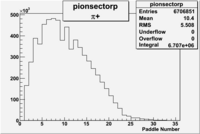 |
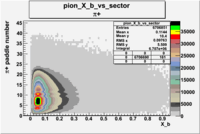 |
7 |
| && | 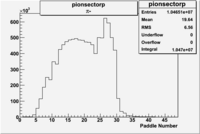 |
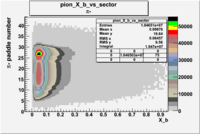 |
27 |
| Detected particles in the final state and chosen pion paddle number | paddle number | vs paddle number | vs paddle number when | vs paddle number when |
| && , | 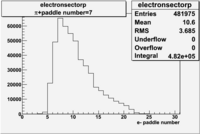 |
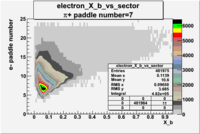 |
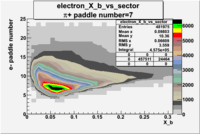 |
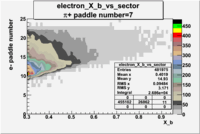
|
| && , | 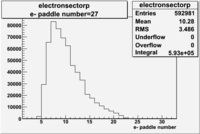 |
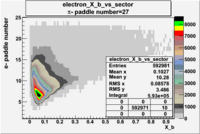 |
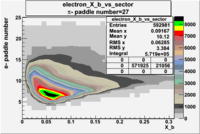 |
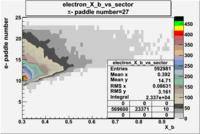
|
Positive Torus
Using runs with NH3 target
| Detected particles in the final state | X_b vs pion paddle number | Chosen pion paddle number |
| && | 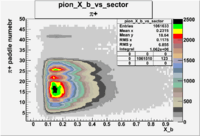 |
27 |
| && | 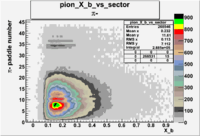 |
7 |
| Detected particles in the final state and chosen pion paddle number | paddle number | vs paddle number | vs paddle number when | vs paddle number when |
| && , | 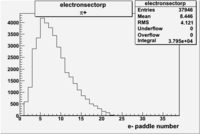 |
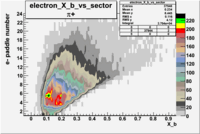 |
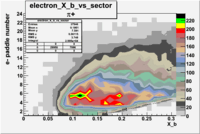 |
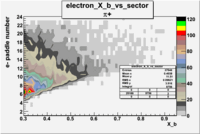
|
| && , | 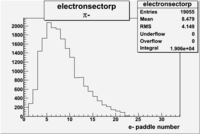 |
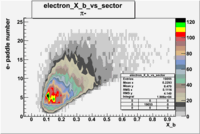 |
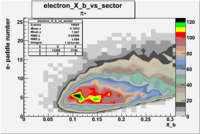 |
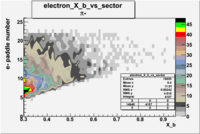
|
2/10/2010
| root file | reaction | W vs | # events for <1.232 | ||||
| 1 | B<0, pi^-=27 && e^-=11 | 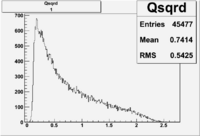 |
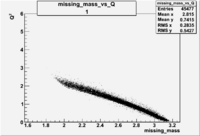 |
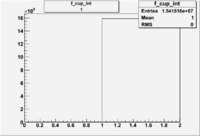 |
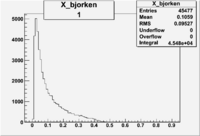 |
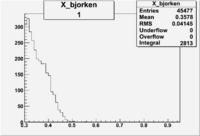 |
9868 |
| 2 | B>0, pi^+=27 && e^-=11 | 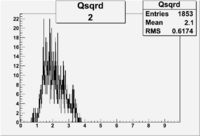 |
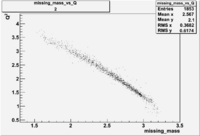 |
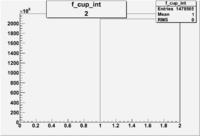 |
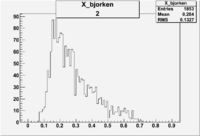 |
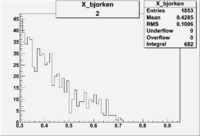 |
412 |
| 3 | B>0, pi^+=27 && e^-=7 | 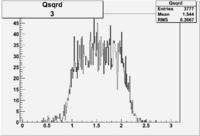 |
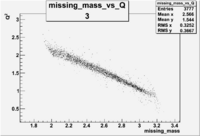 |
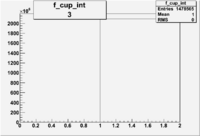 |
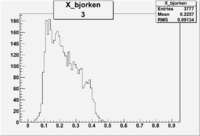 |
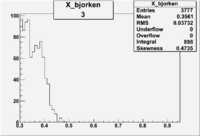 |
793 |
| 4 | B>0, pi^-=7 && e^-=11 | 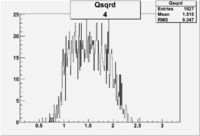 |
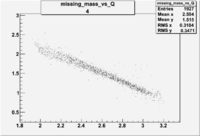 |
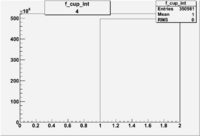 |
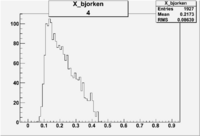 |
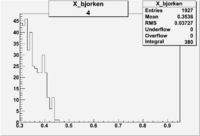 |
400 |
| 5 | B<0, pi^+=7 && e-=11 | 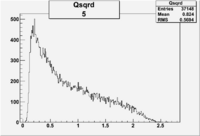 |
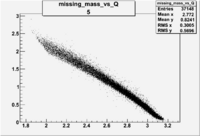 |
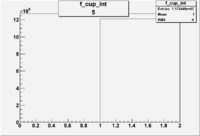 |
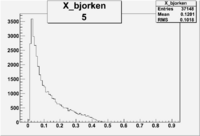 |
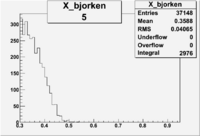 |
9406 |
Rate differences
Which paddle do we expect the Pion to hit if we flip the direction of the B-Field?
Only using Certain Paddles
or
Looking at Ratio_3 and Ratio_4 one can make a conclusion that we are detecting ~% more type hadrons.
Choosing events Below 1.232 GeV && Certain paddle numbers
22-02-2010
- NH3 Target, two file lists: NH3Bn.list (B<0, 26994-26983) && NH3Bp.list (B>0, 27074-27079)
no paddle cuts
- A.) B>0
1.) B>0, && , NH3Bp1_1.root
2.) B>0, && , NH3Bp2_1.root
- B.) B<0
1.) B<0, && , NH3Bn1_1.root
2.) B<0, && , NH3Bn2_1.root
Paddle Cuts
Again, choosing events below 1.232 GeV, applying cuts, and plotting Histograms for certain electron and pion paddles.
_vs_, , Fcup && .
- A.) B>0
1.) B>0, && , NH3Bp1.root
2.) B>0, && , NH3Bp2.root
- B.) B<0
1.) B<0, && , NH3Bn1.root
2.) B<0, && , NH3Bn2.root
| File | W vs | |||
| NH3Bp1.root | 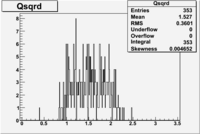 |
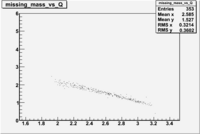 |
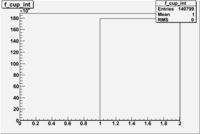 |
200px |
| NH3Bp2.root | 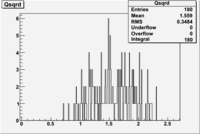 |
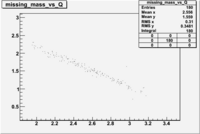 |
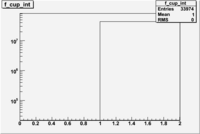 |
200px |
| NH3Bn1.root | 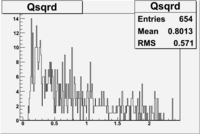 |
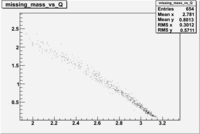 |
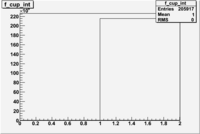 |
200px |
| NH3Bn2.root | 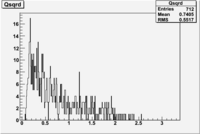 |
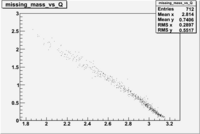 |
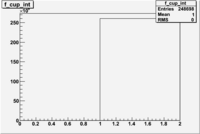 |
200px |
Now you need to cut on . The above suggests that looking at 1 < < 2 GeV/c^2 may be a good starting point.
The idea is to compare the outbending (B<0) rate in paddle 27 to the inbending(B>0) rate in paddle 7 when 1 < < 2. For the same kinematics the rates should be the same because the reaction is the same. Do the same for to see if it is consistent. This will show much flipping the magnet polarity impacts the rate measurement. Are the differences due to the B-field change or the scintillator efficiency, or to the track reconstruction? Our goal is to argue that the detector has the same efficiency for detecting and in the same scintillator when the Torus B-field direction is flipped.
1 < < 2
| File | W vs | ||
| NH3Bp1.root | 200px | 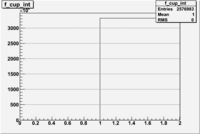 |
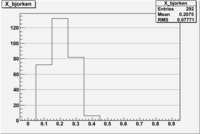
|
| NH3Bp2.root | 200px | 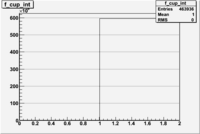 |
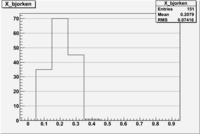
|
| NH3Bn1.root | 200px | 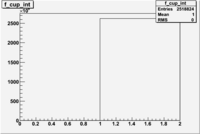 |
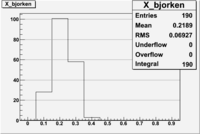
|
| NH3Bn2.root | 200px | 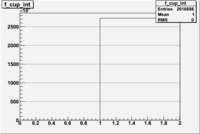 |
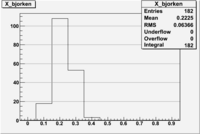
|
| bin | Bp1/Bn1 | Bp2/Bn2 |
| 0.1 | 2.38 0.299 | 1.09 0.405 |
| 0.2 | 1.29 0.188 | 3.59 0.215 |
| 0.3 | 1.38 0.242 | 4.6 0.284 |
| 0.4 | 1.62 1.02 | 3.76 1.28 |
Angle vs Paddle Number Distribution
| # | angle vs paddle number | angle vs paddle number |
| B>0, && | 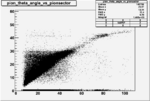 |
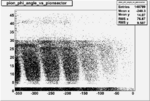
|
| B>0, && | 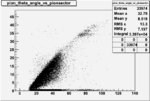 |
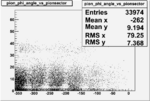
|
| B<0, && | 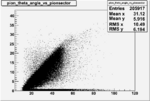 |
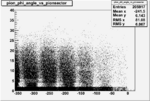
|
| B<0, && | 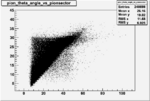 |
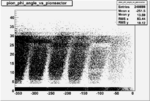
|
26/04/2010
NH3Bn positive pion runs
7.root - 27.root
| pion paddle number | x_bj=0.1 | x_bj=0.2 | x_bj=0.3 | x_bj=0.4 |
| 1 | 10 3.16 | 38 6.16 | 20 4.47 | 2 1.4 |
| 2 | 14 3.7 | 60 7.7 | 28 5.3 | 0 |
| 3 | 20 4.5 | 93 9.6 | 48 6.9 | 3 1.7 |
| 4 | 26 5.1 | 87 9.3 | 53 7.3 | 5 2.2 |
| 5 | 24 4.9 | 94 9.7 | 42 6.5 | 6 2.4 |
| 6 | 30 5.5 | 125 1.1 | 79 8.9 | 7 2.6 |
| 8 | 16 4 | 102 10 | 65 8.1 | 4 2 |
| 9 | 19 4.3 | 96 9.8 | 48 6.9 | 3 1.7 |
| 10 | 23 4.8 | 98 9.9 | 57 7.5 | 2 1.4 |
| 11 | 16 4 | 71 8.4 | 38 6.2 | 2 1.4 |
| 12 | 20 4.5 | 85 9.2 | 53 7.3 | 6 2.5 |
| 13 | 13 3.6 | 73 8.5 | 42 6.5 | 5 2.2 |
| 14 | 19 4.3 | 75 8.7 | 38 6.2 | 3 1.7 |
| 15 | 15 3.9 | 62 7.9 | 25 5 | 2 1.4 |
| 16 | 22 4.7 | 58 7.6 | 42 6.5 | 0 |
| 17 | 5 2.2 | 40 6.3 | 23 4.8 | 4 2 |
| 18 | 10 3.2 | 33 5.7 | 18 4.2 | 2 1.4 |
| 19 | 7 2.6 | 27 5.2 | 21 4.5 | 1 1 |
| 20 | 3 1.7 | 34 5.8 | 13 3.6 | 0 |
| 21 | 3 1.7 | 16 4 | 9 3 | 0 |
| 22 | 2 1.4 | 10 3.2 | 2 1.4 | 0 |
| 23 | 0 | 2 1.4 | 3 1.7 | 1 1 |
| 24 | 0 | 1 1 | 1 1 | 0 |
NH3Bp positive pion runs
#p.root
| pion paddle number | x_bj=0.1 | x_bj=0.2 | x_bj=0.3 | x_bj=0.4 |
| 4 | 21 4.6 | 15 3.9 | 2 | |
| 5 | 39 | 58 | 18 | |
| 6 | 56 | 91 | 49 | |
| 7 | 90 | 110 | 82 | 5 |
| 8 | 81 | 155 | 78 | 3 |
| 9 | 68 8.1 | 139 12 | 85 9.2 | 4 2 |
| 10 | 83 9.1 | 181 13 | 88 9.4 | 8 2.8 |
| 11 | 102 10 | 164 13 | 96 9.8 | 8 2.8 |
| 12 | 103 10.1 | 188 13.7 | 122 11 | 8 2.8 |
| 13 | 85 9.2 | 203 14.2 | 132 11.5 | 16 4 |
| 14 | 105 10.2 | 219 14.8 | 120 10.9 | 11 3.3 |
| 15 | 116 10.8 | 192 13.8 | 113 10.6 | 8 2.8 |
| 16 | 91 9.5 | 208 14.4 | 134 11.6 | 9 3 |
| 17 | 98 9.9 | 187 13.7 | 112 10.6 | 9 3 |
| 18 | 106 10.3 | 159 12.6 | 121 11 | 7 2.6 |
| 19 | 91 9.5 | 166 12.9 | 107 10.3 | 9 3 |
| 20 | 83 9.1 | 138 11.7 | 90 9.5 | 7 2.6 |
| 21 | 81 9 | 167 12.9 | 110 10.5 | 11 3.3 |
| 22 | 87 9.3 | 164 12.8 | 84 9.2 | 5 2.2 |
| 23 | 77 8.8 | 98 9.9 | 73 8.5 | 6 2.4 |
| 24 | 86 9.3 | 131 11.4 | 81 9 | 6 2.4 |
| 25 | 96 9.8 | 185 13.6 | 92 9.6 | 14 3.7 |
| 26 | 87 9.3 | 147 12.1 | 97 9.8 | 8 2.8 |
| 27 | 72 8.5 | 132 11.5 | 82 9.1 | 6 2.4 |
| 28 | 64 8 | 131 11.4 | 73 8.5 | 10 3.2 |
| 29 | 46 6.9 | 101 10 | 53 7.5 | 2 1 |
| 30 | 13 3.5 | 14 3.8 | 18 4.8 | 1 1 |
06-02-2010
Electron Efficiency
Chosen electron paddles are following for the positive and negative paddles respectively: 7 and 11.
electroneffbp.root && electroneffbn.root
B>0
TH1.Print Name = Qsqrd, Entries= 323638, Total sum= 323634 fSumw[0]=0, x=-0.2 fSumw[1]=0, x=-0.1 fSumw[2]=0, x=9.71039e-18 fSumw[3]=0, x=0.1 fSumw[4]=3, x=0.2 fSumw[5]=21, x=0.3 fSumw[6]=93, x=0.4 fSumw[7]=285, x=0.5 fSumw[8]=575, x=0.6 fSumw[9]=1148, x=0.7 fSumw[10]=2478, x=0.8 fSumw[11]=9402, x=0.9 fSumw[12]=24380, x=1 fSumw[13]=31648, x=1.1 fSumw[14]=29967, x=1.2 fSumw[15]=27864, x=1.3 fSumw[16]=27157, x=1.4 fSumw[17]=26820, x=1.5 fSumw[18]=25603, x=1.6 fSumw[19]=25027, x=1.7 fSumw[20]=24470, x=1.8 fSumw[21]=23512, x=1.9 fSumw[22]=20320, x=2 fSumw[23]=13453, x=2.1 fSumw[24]=6738, x=2.2 fSumw[25]=2043, x=2.3 fSumw[26]=449, x=2.4 fSumw[27]=119, x=2.5 fSumw[28]=41, x=2.6 fSumw[29]=13, x=2.7 fSumw[30]=5, x=2.8 fSumw[31]=4, x=2.9
B<0
TH1.Print Name = Qsqrd, Entries= 716018, Total sum= 716011
fSumw[0]=0, x=-0.2 fSumw[1]=0, x=-0.1 fSumw[2]=180, x=9.71039e-18 fSumw[3]=112762, x=0.1 fSumw[4]=160348, x=0.2 fSumw[5]=91665, x=0.3 fSumw[6]=62692, x=0.4 fSumw[7]=46135, x=0.5 fSumw[8]=35169, x=0.6 fSumw[9]=28473, x=0.7 fSumw[10]=23810, x=0.8 fSumw[11]=20763, x=0.9 fSumw[12]=18452, x=1 fSumw[13]=16021, x=1.1 fSumw[14]=14494, x=1.2 fSumw[15]=12731, x=1.3 fSumw[16]=11610, x=1.4 fSumw[17]=10422, x=1.5 fSumw[18]=9437, x=1.6 fSumw[19]=8929, x=1.7 fSumw[20]=8149, x=1.8 fSumw[21]=7504, x=1.9 fSumw[22]=6209, x=2 fSumw[23]=4557, x=2.1 fSumw[24]=2948, x=2.2 fSumw[25]=1625, x=2.3 fSumw[26]=659, x=2.4 fSumw[27]=195, x=2.5 fSumw[28]=50, x=2.6 fSumw[29]=18, x=2.7 fSumw[30]=4, x=2.8 fSumw[31]=7, x=2.9
Electron Eff Result
| Inclusive detected electrons -vs- Q-squared | Inclusive Missing Mass (W) for 1.0 Q^2 <1.2 |
Media:electronefficiencyratioBp7Bn11.txt
Now plot efficiency as function of X_{BJ} and W < 1232 and require pion.
Positive Pion Efficiency dependence on
Pion and electron both required.
W<1232 and
Now cut on Q^2 where the inclusive electron rates are the same with both torus settings and then require at least one positive pion.
| X_bj | B_n/B_p Rates |
|---|---|
| 0.14 | 0.25 0.55 |
| 0.15 | 0.74 0.27 |
| 0.17 | 1.07 0.18 |
| 0.19 | 1.3 0.13 |
| 0.2 | 1.4 0.14 |
There appears to be a region around X_{Bj}= 0.2 which has the same number of pions detected for both torus settings.
Negative Pion Efficiency dependence on
Pion and electron both required(e_sector=7 for B>0 && e_sector=11 for B<11).
Now cut on Q^2 where the inclusive electron rates are the same with both torus settings and then require at least one positive pion.
| B_p/B_n Rates | |
|---|---|
| 0.2 | 0.004 0.55 |
| 0.3 | 0.017 0.5 |
| 0.4 | 0.069 0.6 |
| 0.5 | 0.0262 0.6 |
| 0.6 | 0.039 0.5 |
| 0.7 | 0.1 0.64 |
| 0.8 | 0.055 0.52 |
| 0.9 | 0.259 0.52 |
| 1 | 1.232 0.52 |
| 1.1 | 3.96 0.8 |
There DOES NOT appears to be a region which has the same number of negative pions detected for both torus settings.
What is wrong?
8/13/10
1.) Change Osipenko cuts to maximize electrons when B <0 but still minimize impact of negative pion contamination. Look at effects on Npe distribution.
Insert current number of electron events that are removed by the Osipenko cut for B<0. Compare it to event removed by other cuts.
2.) Schedule Prelim exam.
Shropshire has replaced cole.
Members are: Forest, Fisher, Shropshire, Dale, Tatar(?)
Ask Dustin McNulty
1.) [1]
"Original cut parameters generated by Osipenko et.al. were not very efficient for especially outbending data of eg1b experiment. The loss of electrons was substantial. For inbending data, loss of electrons were at acceptable level. To gain some electrons back we generated new cut parametes that will specifically work better for outbending data. Also we slightly adjusted the cut parameters for inbending data for some sectors and segments."
2.) Upgraded Proposal defense presentation(includes event display) File:TamarProposalP 1.pdf
11/10/10
DTS files used for analysis.
Media:ND3Bn.txt
Media:ND3Bp.txt
Media:NH3Bn.txt
Media:NH3Bp.txt
positive
negative
What are the cuts for the above histogram?
pion, OSI, EC
11/30/10
DST ntuple suggestions
- Event number and run number should be recorded. Run number is in RUNINFO. Event number should be in the event packet.
- Create variable called helicity and fill it with absolute helicity.
GEM detector
- order mylar and copper tape., 1" wide, $20 worth of each
- check DPO 4104 see if working properly
- find 10 frames for Qweak GEM foils (or order more)
- check gas supply
12/6/10
DST ntuple
Run number looks good.
PbPt values are all non-zero now.
1) Some of the TORUS values are zero when they should be positive?
Doesnt matter. There are totally four files: ND3_target+Torus_positive, ND3_target+Torus_negative, NH3_target+Torus_positive and NH3_target+Torus_negative. So not an issue.
2.) Electrons have less than 0.25 GeV energy?
Still dont know.
3.) ASYM=HWP*LINAC*P_T is in the root file.
4.) Where are the FC normalization histograms
12/20/10
DST
1.) Looks like a particle ID problem for outbending (B<0) negative pions.
Calculate the missing mass for the and stor it in M_X. (included and corrected in NTUPLE)
Redo all the ntuples.
All ntuples are done.
2.) is run 27048 OK (no target run(empty)), corrected for both target runs
3.) Current quarks(the core of the constituent quark without the gluons and sea quarks(covering). The mass of the current quarks(up and down) is 5-10 MeV), light cone?
pion momentum for different torus settings and targets
pion paddle number for different torus settings
Need a before and after cuts histogram with stats to see number of events dropped
1/24/11
1.) Find energy range with substantial ND3, pi- events when B <0.
Ratio plot for Q^2 and X_{BJ}
once you find the Q^2 and X_BJ range holding a reasonable amount of data.
2.) Inclusive electron scattering ratio of
| Inclusiveelectrons -vs- Q-squared | Inclusive Missing Mass (W) for 1.0 Q^2 <1.2 |
| [[|300px|thumb|The ratio of inclusive electrons detected in scintillator paddle #7 when Btorus >0 (B_p)to inclusive electrons detected by paddle 11 when B<0(B_n) NH3 Target]] | [[|300px|thumb|The inclusive missing mass W for each torus setting. Dashed line is B>0 and solid line is B<0]] |
| [[|300px|thumb|The ratio of inclusive electrons detected in scintillator paddle #7 when Btorus >0 (B_p)to inclusive electrons detected by paddle 11 when B<0(B_n)]]ND3 Target | [[|300px|thumb|The inclusive missing mass W for each torus setting. Dashed line is B>0 and solid line is B<0]] |
| [[|300px|thumb|The ratio of inclusive electrons detected in scintillator paddle #7 when Btorus >0 (B_p)to inclusive electrons detected by paddle 11 when B<0(B_n)]] Both Targets | 300px|thumb|The inclusive missing mass W for each torus setting. Dashed line is B>0 and solid line is B<0 |
3.) Semi Inclusive pion production ratios -vs- Q^2, Only electron cuts
/cache/mss/clas/eg1b/production/pass1/v4/4p2out/misc/dst/dst2828*
ND3 4.2-
28287 28288 28289 28311 28312 28313 28314 28315 28316 28317 28319 28320 28321 28322 28323 28335 28336 28337 28338 28339 28340 28341 28351 28352 28367 28368 28369 28370 28371 28372 28373 28374 28375 28376 28377 28378 28379 28380 28381 28385 28386 28389 28390 28391 28392 28393 28394 28396 28397 28398 28399 28400 28401
ND3 4.2+
28074 28075 28076 28077 28078 28079
NH3 4.2-
28407 28408 28409 28410 28411 28412 28413 28414 28415 28416 28417 28422 28423 28424 28425 28426 28427 28428 28429 28432 28433 28438 28439 28443 28445 28446 28447 28448 28449 28450 28456 28457 28458 28460 28461 28462 28463 28464 28467 28469 28471 28472 28473 28476 28478 28479
NH3 4.2+
28205 28207 28208 28209 28210 28211 28212 28214 28215 28216 28217 28222 28223 28224 28225 28226 28227 28230 28231 28232 28233 28234 28235 28236 28240 28242 28244 28245 28246 28247 28249 28250 28252 28253 28254 28255 28256 28260 28261 28262 28263 28264 28265 28266 28272 28274 28275 28276 28277
File locations http://www.jlab.org/Hall-B/secure/eg1/EG2000/nevzat/UPGRADE_DST/
/cache/mss/home/nguler/dst
Rates before and after requiring pions
all the cuts are applied, except NPHE>2.5 cut.
4.2 GeV, ND3 target, 98 files, B<0
4.2 GeV, ND3 target, 32 files, B>0
The ratio for ND3 4.2 GeV data
Electron paddle selection
Inclusive
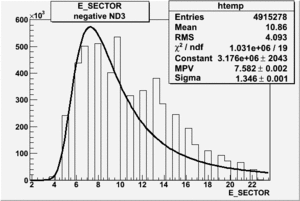 |
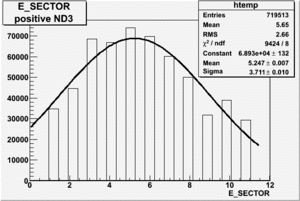
|
| Electron Paddle Number(Inclusive, B<0, 4.2 GeV Beam, ND3 Target) | Electron Paddle Number(Inclusive, B>0, 4.2 GeV Beam, ND3 Target) |
Semi-Inclusive
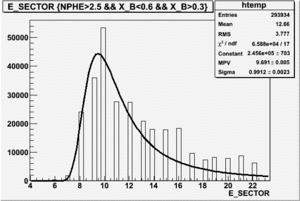 |
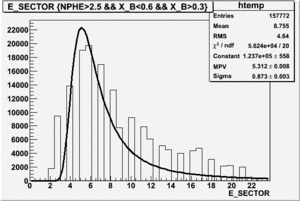
|
| Electron Paddle Number(Semi-Inclusive, B<0, 4.2 GeV Beam, ND3 Target) | Electron Paddle Number(Semi-Inclusive, B>0, 4.2 GeV Beam, ND3 Target) |
B>0, ND3 Electron paddle number=5
B<0, ND3 Electron paddle number=10
The Ratio
| X_B | without pions | with pions |
| 0.3 | ||
| 0.35 | ||
| 0.4 | ||
| 0.45 | ||
| 0.5 | ||
| 0.55 |
The ratio for NH3 4.2 GeV data
Electron paddle selection
Inclusive
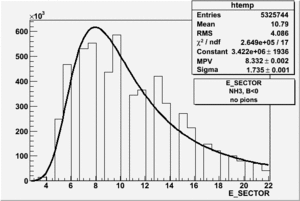 |
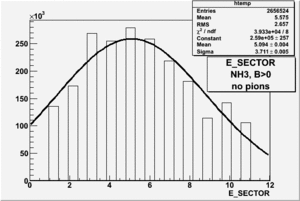
|
| Electron Paddle Number(Inclusive, B<0, NH3 target, 4.2 GeV Beam) | Electron Paddle Number(Inclusive, B>0, NH3 target, 4.2 GeV Beam) |
Semi-Inclusive
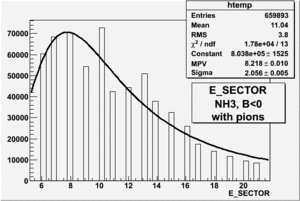 |
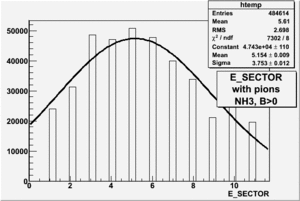
|
| Electron Paddle Number(Semi-Inclusive, B<0, NH3 target, 4.2 GeV Beam) | Electron Paddle Number(Semi-Inclusive, B>0, NH3 target, 4.2 GeV Beam) |
B>0, NH3 Electron paddle number=5
B<0, NH3 Electron paddle number=10
The Ratio
| X_B | without pions | with pions |
| 0.3 | ||
| 0.35 | ||
| 0.4 | ||
| 0.45 | ||
| 0.5 | ||
| 0.55 |
1/31/11
Electron paddle number for B>0 is 5 and for B<0 - 10. The cut was applied on :
Inclusive
1.) Overlap electron kinematic (, W, Momentum) for B>0 and B<0 and ND3 and NH3.
(NH3,B>0), (NH3,B<0), (ND3,B>0) && (ND3,B<0)
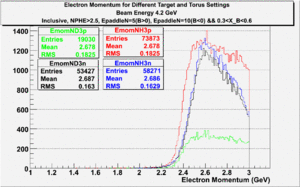 |
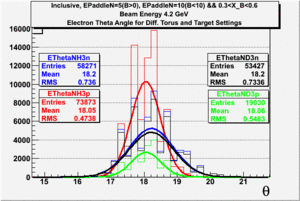 |
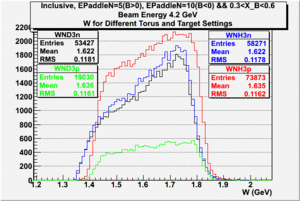
|
| Electron Momentum((NH3,B>0), (NH3,B<0), (ND3,B>0) && (ND3,B<0)) | Electron Angle((NH3,B>0), (NH3,B<0), (ND3,B>0) && (ND3,B<0)) | W mass((NH3,B>0), (NH3,B<0), (ND3,B>0) && (ND3,B<0)) |
2.) Now plot ratio (B< 0/B>0) electron kinematic (, W, Momentum) for ND3 and NH3. ( I expect 2 curves in one plot)
,
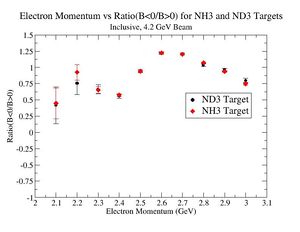 |
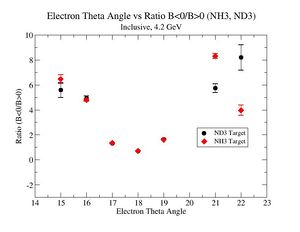 |
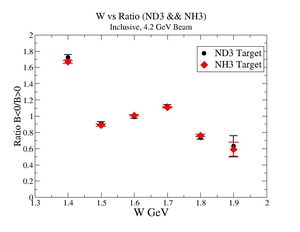
|
| Electron Momentum(, ) | Electron Angle(, ) | W mass(, ) |
2.) Target ratio (B< 0/B>0) Difference electron kinematic (, W, Momentum) (Ration for ND3 target - Ratio for NH3 target). ( I expect 1 curves in one plot)
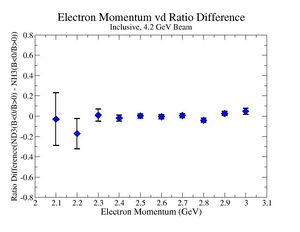 |
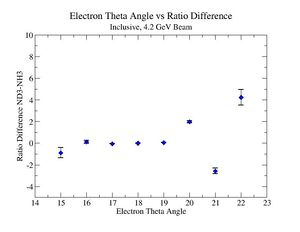 |
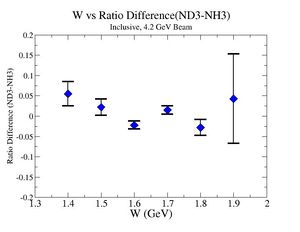
|
| Electron Momentum () | Theta Angle() | W mass() |
Semi-Inclusive
(NH3,B>0), (NH3,B<0), (ND3,B>0) && (ND3,B<0)
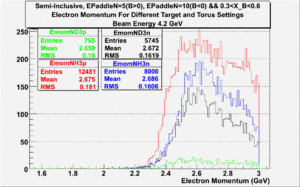 |
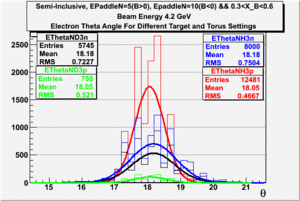 |
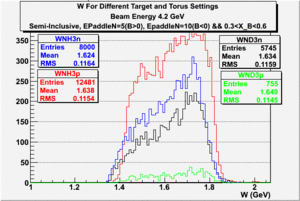
|
| Electron Momentum((NH3,B>0), (NH3,B<0), (ND3,B>0) && (ND3,B<0)) | Electron Angle((NH3,B>0), (NH3,B<0), (ND3,B>0) && (ND3,B<0)) | W mass((NH3,B>0), (NH3,B<0), (ND3,B>0) && (ND3,B<0)) |
2
